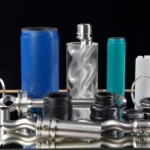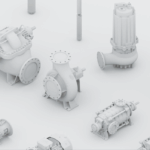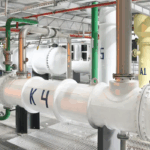Why is it that homemade ketchup, mayonnaise, milk, juice, cream or mashed vegetables taste so different from store-bought ones? Do you think it's because of colourings, preservatives and other food additives? But it's not! It's all about the production technology of these products, which cannot do without the use of a homogeniser.
Foods need to be homogeneous for a variety of reasons: they look better; they have a better texture when we eat them; they remain stable and therefore have a longer shelf life.
A homogeniser is a device designed for mixing and crushing liquid products into smaller fractions. The main feature is that the device does not just mix products like a conventional mixer, but does it so thoroughly that all the components that make up the liquid base form a single homogeneous mass. As a result, the products have high homogeneity, a long shelf life, better digestibility, improved appearance, and better taste.
For example, homogenising milk allows for the production of better quality fermented milk products (sour cream, kefir, yoghurt, etc.), as it increases the strength and consistency, and even prevents the formation of fat plugs.
Today, homogenisers are indispensable equipment at modern enterprises engaged in the production of food, cosmetics, pharmaceuticals, etc. Without the use of a homogeniser, it is impossible to produce thin, long-lasting fat emulsions that do not delaminate.
Since the principle of the device is to grind the fat globules to the maximum extent possible, plunger pumps ensure efficient operation of the homogeniser.
If you are looking to purchase homogenisers, you will find it useful to familiarise yourself with the Italian manufacturer FBF ITALIA. Thanks to their many years of experience, they are an exemplary manufacturer of equipment for the food industry. They design and manufacture:
- homogenisers;
- ultra-high pressure homogenisers;
- laboratory homogenisers;
- Direct displacement piston pumps.
- Homogenizer
FBF homogenisers are CE-certified and available in capacities from 50 to 50,000 LPH, with homogenising pressures up to 2,000 bar.
Compression head and homogenising valve
- The compression head is made of a one-piece unit (easy and quick to maintain) made of high quality stainless steel of a special type, with a 5-year warranty against cracks and defects.
- The pump pistons are coated with a special diamond-like carbon coating (standard).
- Interchangeable valve group assemblies are available in special materials depending on the products to be processed.
- The homogenisation valves are designed to be energy efficient, with high stability and alignment of the moving parts (impact head) due to the hydrodynamic assembly, which ensures vibration-free homogenisation.
- Spring-loaded sanitary safety valve with replaceable flapper and seat.

- The pump casing is made of high-strength cast iron with thick walls, which can withstand heavy loads and dampen vibrations.
- The crankshaft is made from a single piece of heat-treated special steel with superfinishing and full nitriding. The crankshaft is supported by robust roller bearings (bronze bearings are used only on the connecting rods).
- Transmission with a double reduction stage: V-belts/pulleys, with parallel axle gearbox.
- 3 phases, 4 poles, AC motor.
- Oil spray lubrication system. The mechanical components are in an oil bath and the correct oil level is checked by a suitable sight glass mounted on the front of the machine.
- The structure is made of a square tube frame made of stainless steel with individual stainless steel panels with a matt finish.
Compression head and homogenising valve
- The compression head is made of a single block of high quality stainless steel of a special type, forged and ultrasonically tested, with a 5-year warranty against cracks and defects.
- The transfer pistons are coated with a special DiamondLikeCarbon coating (standard).
- The valve group assemblies feature interchangeable seats and hemispherical valve flaps, making them ideal for processing a wide range of products.
- The homogenisation valves are designed to be energy efficient, with high stability and alignment of the moving parts (impact head) due to the hydrodynamic assembly, which ensures vibration-free homogenisation.
- Spring-loaded sanitary safety valve with replaceable flapper and seat.
- The pump casing is made of high-strength cast iron with thick walls and is designed to withstand heavy loads and dampen vibration.
- The crankshaft is made of special steel, made from a single piece of heat-treated steel with superfinishing and full nitriding; the crankshaft is supported by robust roller bearings (bronze bearings are used only on the crank journals)
- Power transmission with two-stage gearbox: V-belts with parallel axis gearbox from a leading company (eliminating the need for water cooling).
- 3-phase, 4-pole AC motor supplied by a leading company.
- The lubrication system is of the pressure type. The correct oil level is checked via the oil sight glass on the front of the machine and, in the event of irregular oil pressure, a warning light is activated as well as forced filtering of possible impurities. For the best possible heat balance/dissipation, all transmission components are immersed in an oil bath.
- The frame consists of a thick, square section of powder-coated carbon steel and has removable stainless steel panels with a brushed finish.
Compression head and homogenising valve
- The compression head is made of a single block of high quality stainless steel of a special type, forged and ultrasonically tested, with a 5-year warranty against cracks and defects.
- Each valve assembly is housed in a separate block made of special AISI 316 stainless steel.
- The pump pistons are manufactured with a rear cooling chamber, a double guide for perfect alignment and a special diamond-shaped carbon coating (as standard).
- The valve group assemblies feature interchangeable seats and hemispherical valve flaps, which is ideal for handling a very wide range of products.
- The homogenisation valves are designed to provide efficient energy use with high stability and alignment of the moving parts (impactor) due to the hydrodynamic assembly that ensures vibration-free homogenisation.
- Spring-loaded sanitary safety valve with replaceable flapper and seat.
Motorisation
- The pump casing is made of high-strength, thick-walled material and is designed to withstand heavy loads and dampen vibration.
- The crankshaft is made of special forged steel, machined from a single piece, "multi-stage" heat treatment, superfinishing and full nitriding, ultrasonically inspected. The crankshaft is supported by robust roller bearings (bronze bearings are used only on the connecting rod journals): 5 bearings for machines equipped with 3 discharge pistons, 7 bearings for machines equipped with 5 transfer pistons.
- Double reduction transmission: V-belts/pulleys, with semi-automatic tensioning system, with two helicoidal gears inside the pump casing (slow gear connected directly to the crankshaft)
- Pressure-type lubrication system with oil level detected by a sensor, oil cooling by a tube heat exchanger, irregular pressure alarm, high temperature alarm and forced filtration of any possible impurities. For the best possible heat balance/dissipation, all transmission components are immersed in an oil bath.
- The frame is made of carbon steel square tube, powder-coated and fitted with removable stainless steel panels with a matt finish.
- Laboratory homogenisers

Homolab 2.50 - is a laboratory homogeniser suitable for processing almost 50 litres/hour of product at a homogeniser pressure of 600 bar.
The FBF ITALIA laboratory homogeniser has two pump pistons.
This characteristic allows the homogenising heads to process a product sample for testing on single-piston machines. It also allows the homogenisation result obtained in laboratory tests to be transferred to industrial production.
- Direct displacement pumps

- Homogeniser for small batch ice cream production

With a flow rate of 400 l/h and an operating pressure of 120 bar, our MICROLAB 400 is ideal for small batches. It can be used in both ways: with one pasteuriser (recirculation mode) or two pasteurisers (in-line installation between two pasteurisers).
The purpose of the homogenisation process is to have a positive effect on the taste and aroma of the ice cream. It also makes the ice cream cream creamier and less cold. Thanks to the homogenisation process, ice cream has a longer whipping time, higher storage stability, better dissolution and increased digestibility.
How does the MICROLAB 400 work?
The pumping pistons push the product through the homogenising valve under a pressure of 120 bar. In the homogenising valve, the product is subjected to a micronisation process due to the rapid increase in speed (up to 9,300 cm/s), strong cavitation and friction between the cells, which reduces the average diameter of the solid fat particle to a few micrometres in diameter (<0.0035 mm). The micronisation process removes the outer coating of fat cells, increases the area of contact with emulsifiers, promotes the water-oil phase, makes the ice cream texture softer and imparts a dry taste, which makes the ice cream a quality product.
These are just a few of the benefits you get from using this type of equipment. The results, with an excellent price-performance ratio, make the new FBF ITALIA technology particularly beneficial.
We can offer not only high-quality services for the supply of this equipment, but also ongoing technical support in the future. Our employees are able to carry out repairs in a short time right at the factory, providing all the necessary consulting and technical assistance.
For more information, please contact our technical specialists at +38 044 390 73 38.






